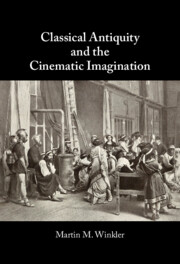Book contents
- Classical Antiquity and the Cinematic Imagination
- Classical Antiquity and the Cinematic Imagination
- Copyright page
- Dedication
- Contents
- Illustrations
- Preface
- I Prolegomena
- II Progymnasmata: Ways of Seeing
- III Complex Cinematism
- IV The Cinema Imagines Difficult Texts
- Chapter 10 Apollonius and the Golden Fleece; or, The Case of the Missing Ecphrasis
- Chapter 11 Arrow and Axes in the Odyssey; or, The Case of the Insoluble Enigma
- Chapter 12 Peckinpah’s Aristotle; or, How Well Does The Wild Bunch Fit The Poetics?
- V Epilegomena
- Bibliography
- Index
Chapter 10 - Apollonius and the Golden Fleece; or, The Case of the Missing Ecphrasis
from IV - The Cinema Imagines Difficult Texts
Published online by Cambridge University Press: 15 February 2024
- Classical Antiquity and the Cinematic Imagination
- Classical Antiquity and the Cinematic Imagination
- Copyright page
- Dedication
- Contents
- Illustrations
- Preface
- I Prolegomena
- II Progymnasmata: Ways of Seeing
- III Complex Cinematism
- IV The Cinema Imagines Difficult Texts
- Chapter 10 Apollonius and the Golden Fleece; or, The Case of the Missing Ecphrasis
- Chapter 11 Arrow and Axes in the Odyssey; or, The Case of the Insoluble Enigma
- Chapter 12 Peckinpah’s Aristotle; or, How Well Does The Wild Bunch Fit The Poetics?
- V Epilegomena
- Bibliography
- Index
Summary
Ecphrasis, as we saw in Chapter 4, is a characteristic feature of the enargeia of epic, but there is one case in which an expected ecphrasis is conspicuous for its absence. The Argonautica of Apollonius of Rhodes tells the myth of Jason, Medea, and the Argonauts, already encountered in Chapter 2. The Golden Fleece, one of the most famous supernatural objects in all mythology, calls for a detailed description, but Apollonius does not provide one. Films that retell the myth must, however, show it. Hence the concept of neo-mythologism, a useful term coined by director Vittorio Cottafavi: an original work based on myth must be changed for its visual adaptation. The chapter reviews and interprets the different appearances of the Golden Fleece in romantic adventure films (Hercules, The Giants of Thessaly, Jason and the Argonauts), art-house cinema (Medea, The Golden Thing), Ray Harryhausen’s stop-motion animation, and computer-generated images.
Keywords
- Type
- Chapter
- Information
- Classical Antiquity and the Cinematic Imagination , pp. 347 - 376Publisher: Cambridge University PressPrint publication year: 2024

